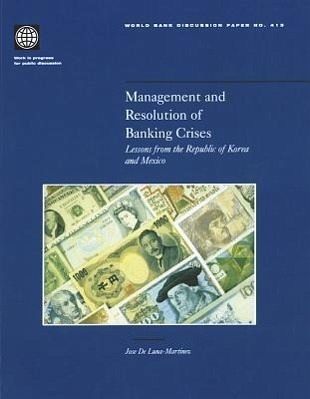Nicht lieferbar

Management and Resolution of Banking Crises: Lessons from the Republic of Korea and Mexico
Versandkostenfrei!
Nicht lieferbar
What can be done to rapidly and effectively contain systemic risks, restore the solvency and profitability of financial institutions, minimize the impact of financial sector distress on the economy and limit the fiscal costs of a crisis? What set of policies contribute to a rapid and successful resolution of a banking crisis and under what conditions? Can a model of bank restructuring that proved to be successful in one country be easily implemented in others? The resolution of a banking crisis is not an event, but a long and complex process. This paper analyzes and compares the causes of the ...
What can be done to rapidly and effectively contain systemic risks, restore the solvency and profitability of financial institutions, minimize the impact of financial sector distress on the economy and limit the fiscal costs of a crisis? What set of policies contribute to a rapid and successful resolution of a banking crisis and under what conditions? Can a model of bank restructuring that proved to be successful in one country be easily implemented in others? The resolution of a banking crisis is not an event, but a long and complex process. This paper analyzes and compares the causes of the banking crises in Korea and Mexico, as well as the policies and tools utilized for managing and resolving them. The banking crises of Korea and Mexico pose important similarities. Both crises were triggered by sudden currency devaluations. There were other similarities as well, but there were major differences in how each country resolved its crisis. This report identifies and explains the main differences in crisis management and resolution used in both countries. The management of both banking crises are assessed in terms of decisionmaking transparency, speed and sequencing of reforms, and social and political obstacles faced for banking crisis resolution. This report will be of interest to research institutes, central banks, ministries of finance, and multilateral institutions.



